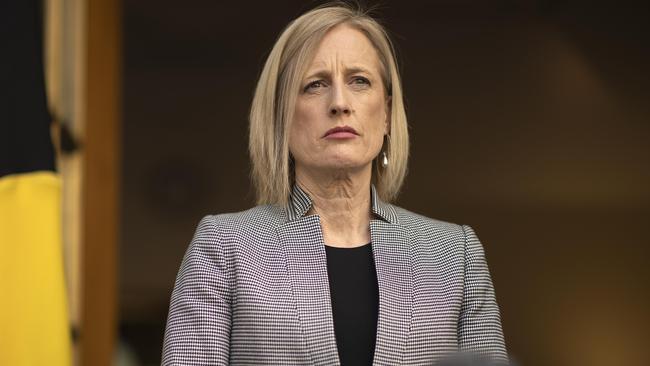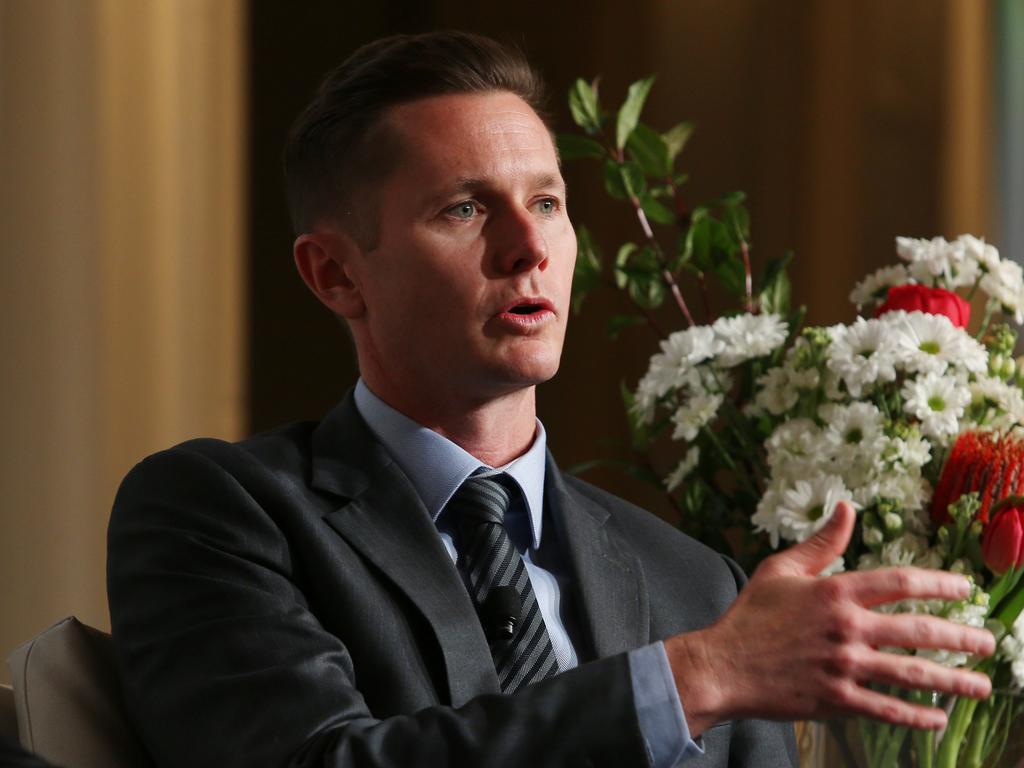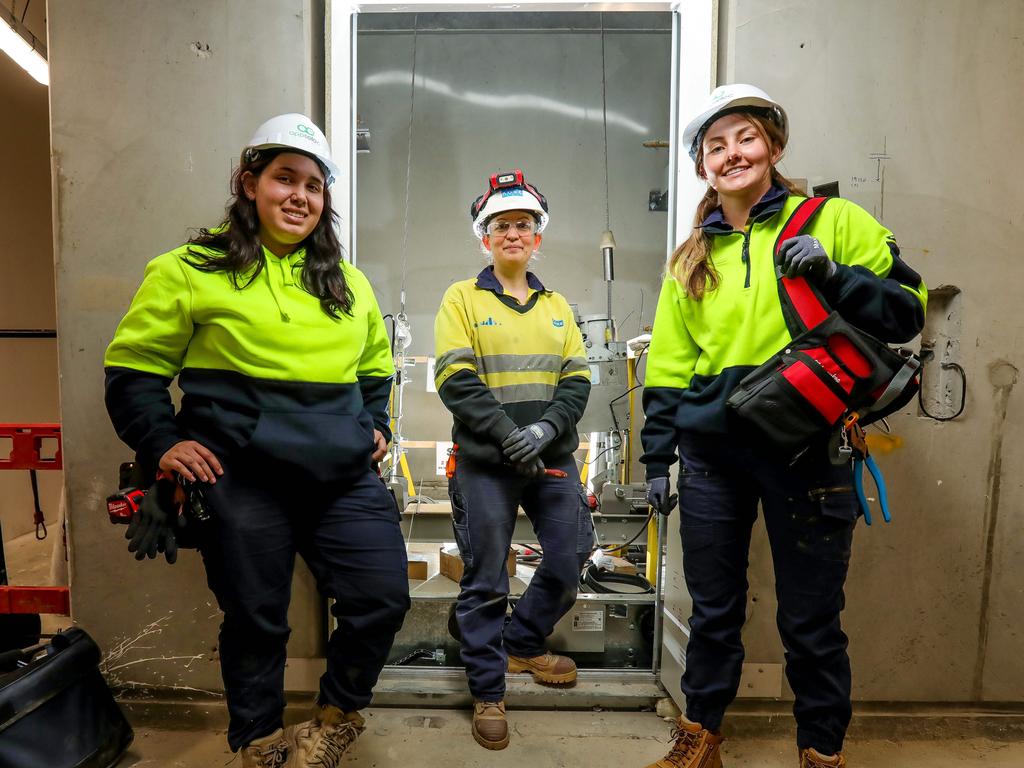Budget: Finance Minister Katy Gallagher flags baked-in spending programs cost an extra $30bn
Higher payments for pensioners, NDIS participants, jobseekers, families and social security recipients have fuelled a budget hit of around $30bn, Finance Minister Katy Gallagher says.

Higher payments for pensioners, NDIS participants, jobseekers, families and social security recipients have fuelled a budget hit of around $30bn, with Labor’s fiscal repair job also coming under stress from baked-in spending programs.
In a pre-budget interview with The Australian, Finance Minister Katy Gallagher said the price tag to increase government payments and help Australians keep up with inflation – estimated at about $30bn over the forward estimates – had put significant stress on the budget.
Senator Gallagher also revealed that just over 80 per cent of the net spend in Tuesday’s budget would be directed at “legacy (programs) and unavoidable pressures”. This includes funding for natural disasters, Covid, zombie spending measures which have languished in the Senate for years and Coalition-era programs that can’t yet be terminated.
In response to cost-of-living pressures, the Albanese government last month announced the largest indexation increases to social security payments in more than 30 years. Pensioners got their biggest increase in 12 years.
Senator Gallagher said the “parameter variations are the big difference here in this budget”.
“The challenge for budget repair is that so much of the commonwealth budget is locked in … for payments through JobSeeker but also family payments, payments to the states and territories that really you can’t tinker with. That’s part of the challenge around budget repair,” she said.
“This budget will be our first crack at the spending audit – making sure we’re reprioritising where we can, reframing and (locking in) sensible saves where we can. It’s an ongoing piece of work. It’s going to be a feature of every budget that we are in.”
Senator Gallagher said the government was committed to supporting a substantial JobSeeker cohort, with welfare numbers remaining high despite the end of Covid-19 restrictions, record job advertisements and low unemployment.
On the back of booming revenues, Tuesday’s budget is expected to show debt levels well-under the projected $1 trillion – although Senator Gallagher warned debt levels remained at record highs and pressures were “increasing, not decreasing”.
“It’s the fastest-growing program in the commonwealth, servicing the debt,” she said. “Jim (Chalmers) and I are pretty clear – we want to make sure that we’re managing that.”
Senator Gallagher the Treasurer’s first budget would deliver on Labor’s election commitments, which responded to cost-of-living pressures without adding to inflation, and was the “start of the story, not the end of it in terms of budget repair”.
“Overall, you’ll see that where we are spending, it’s been pretty modest and responsible.”
She added that some Coalition programs, including the Modernising Business Registers initiative, had been “poorly scoped” and were going to cost more than “anyone ever intended”.
As Coalition MPs warn that infrastructure projects and grants will be slashed in the budget, Senator Gallagher stressed that the government wasn’t focused on indiscriminate cuts. Where they stack up and it makes sense, you’ll see projects continue. There definitely was a component of the spending in the last budget that was ill-defined or unprepared.
“What I’m trying to do is focus on quality spending. The spending (has to) meet a whole range of tests so it aligns with our economic agenda of growing productivity, is good for local communities and stands up to the rigour that underpins the decisions.
“We are not a no-spending approach. As the Finance Minister … I know you have to fund things and people expect you to fund things. When you’re making those decisions, you have to make sure that it stacks up.
“That’s what we’ve tried to do in the first instance with this budget and we’ll keep it going.”
Amid concerns of blowouts in the aged care, NDIS and defence budgets, Senator Gallagher said the government would bank as much revenue as possible in the near-term. “The conversation that Jim and I have been trying to have since we’ve been getting fully briefed on the budget is that the structural pressure in the budget is real. It is part of a longer discussion. I think it’s also about what people value and how they want to see the budget managed.
“You can impose spending restraint, but even in this budget you’re going to have to spend money. The federal budget has to make investments. We want to get things done. We don’t come in here to occupy space.”
As Minister for Women, Senator Gallagher said the “gender story” was an important element of the budget and the work she has led will deliver tangible outcomes and commitments compared with the Morrison government’s “women’s economic security” statements.
Anthony Albanese and Resources Minister Madeleine King on Friday will announce a budget package to support a new national critical minerals strategy and clean-energy technologies.
The budget will include $50.5m over four years to establish the Australian Critical Minerals Research and Development hub to help unlock critical minerals. An additional $50m will fund grants to support early and mid-stage critical minerals projects.
With Australia now the world’s largest lithium producer, exports are forecast to increase more than tenfold over two years to almost $14bn in 2022-23. The development of a battery industry would pump $7.4bn annually into the economy and support 34,700 jobs by 2030. The Prime Minister said the new funding would “ensure we can create and support local jobs, diversify global supply chains and meet the growing demand for batteries, electric vehicles and clean energy technology.”
Dr Chalmers on Thursday revealed new estimates projected the cost of stage three tax cuts had grown to $254bn over nine years.
The Treasurer said he had been “pretty clear over the last few weeks that these tax cuts make an impact on the budget”.
“The point that we’ve been making is that they come in a couple of years’ time. We’ve got more pressing priorities – the budget is not going to be about those tax cuts,” Dr Chalmers said.







To join the conversation, please log in. Don't have an account? Register
Join the conversation, you are commenting as Logout